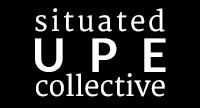The last couple of decades have witnessed a series of regional events that have threatened to shift the tides of global politics. For instance, it was not long ago that the notion of ‘Africa rising’ became such a hot story amidst optimistic accounts of a growing middle class, inclusive technologies, sprawling cities, and budding economies. […]
Our academic culture continues to reward intellectuals who cite big-name, usually white, male, and European theories and theorists. French theorists, in particular, are given special attention. While sympathetic to the compulsion to harness the ideas of great men, one can no longer claim that this is the only way to succeed in the academic publishing […]
I couldn’t quite figure it out. The entire project of housing provision in South African cities seemed to be marked by an almost obsessive sense of calculation, of rational town planning. Most notoriously there is the waiting list. After apartheid, the South African government embarked on a mass formal housing delivery program. In order to […]
Jakarta is marked by a paradox: the city suffers from both too much and too little water. During monsoon season, heavy precipitation strains the network of canals and waterways that weave through Jakarta’s urban fabric, threatening to overwhelm the city. Rivers swell, sometimes inundating housing constructed along their banks. Water collects in roads, bringing the […]
Imagine that you just alighted at Kenya’s Jomo Kenyatta International Airport, only 25 minutes from Nairobi’s Central Business District. Obviously, the first thing that you will want to do is get connected. At the airport, there are often a handful of enthusiastic mobile telecommunications agents and personnel that are readily on standby, more than willing to […]
I’m walking through Guet Ndar, a neighbourhood in Saint-Louis, Senegal. We can hear the waves of the nearby Atlantic Ocean. During my last visit, a number of years ago, they seemed perhaps more distant, whereas now they seem almost upon us. We turn a corner near a mosque and look out. What were once streets […]
Following Donald Trump’s announcement that the United States will withdraw from the Paris Accord, a number of US cities signaled their intention to symbolically join the agreement and demonstrate their commitment to avoiding more than 1.5 C warming. Cities have a unique relationship to global climate change as the historical locus of greenhouse gas emissions […]
The Ways of Knowing Urban Ecologies (WOK-UE) project started in 2011 and finished in December 2016. Amongst other activities, the project proved instrumental in helping to build the Situated UPE Collective from its early days in 2013. Here PI Henrik Ernstson reflects on this now finished research project to exemplify how projects can act as crucial venues for critical social scientists in building collaborations, projects and […]
On the 27th April, over fifty scholars met in Helsingborg, Sweden for a three-day workshop dedicated to waste research in the social sciences and humanities. Organised by Lund University, the ‘Opening the Bin’ workshop sought to critically investigate waste perceptions, materialities, politics, and practices. One of the first workshops of its kind, this gathering provided […]
Unable to attend the American Association of Geographers’ Annual meeting due to travel problems, Mary Lawhon reflects on the retirement of geographer and political ecologist Dianne Rocheleau in this commentary. Drawn from notes for a presentation that unfortunately did not happen due to flight delays, this commentary focuses on Dianne’s generosity as a scholar and her contributions […]











